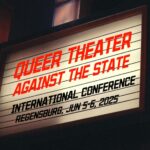 Project „Light On! Queer Literatures and Cultures under Socialism“, Univ. of Regensburg, Tatiana Klepikova (Web)
Project „Light On! Queer Literatures and Cultures under Socialism“, Univ. of Regensburg, Tatiana Klepikova (Web)
Time: 05.-06.06.2025
Venue: Univ. of Regensburg
Proposals by: 29.01.2025
Queer theater has always been the site of utopia, hope, and community-building (Dolan 2005; Muñoz 2009), where queer desire and non-normative imaginaries are celebrated. That said, it has never come without a struggle. In 2024-25, there are many places around the world where queer theater seems impossible but still exists; where it thrives in the open but had to take a long road to do so; or where the futures may seem uncertain.
This conference seeks to explore the paths that queer theater companies, directors, and playwrights across the world have taken throughout the twentieth- and twenty-first centuries to speak queerness to power against normative orders of gender and sexuality. The latter have undergone massive transformations since the early modern era and have come to constitute a core element of the biopolitics of power from the Americas to Africa, Europe, Asia, Australia and Oceania. Darkened theater rooms across the planet have been one site of many, where queerness has come to be negotiated vis-à-vis authoritarian regimes, conservative governments, and religious ideologies. This conference sets out to map such theater spaces across the globe, historicize and contextualize them, while also examining their generative potential for critical theory.
The organisers invite academic and artistic contributions from Gender and Queer Studies, Theater and Performance Studies, Cultural Studies, History, and other disciplines. We welcome abstracts that explore state-funded theaters, underground theaters, and independent theater collectives, as well as directing, drama, and playwriting in the context of global and regional shifts in thinking about non-normative gender and sexuality throughout the twentieth- and twenty-first centuries.
The organisers start the conversation with the following questions in mind but do not limit the inquiry to them:
– What counts as queer theater and gets censored in different contexts?
– What are the modalities of such censorship?
– How does queer theater articulate itself as such vis-à-vis hegemonic norms of gender and sexuality? What is the role of identity, desire, gender subversion?
– What role do other aspects of identity, such as race, class, age, ethnicity, ability, and beyond, play in negotiating the place of queer theater in the state and society?
– What is the role of communities, audiences, critics, etc. in the process of negotiating queer theater as queer in such conditions? What broader infrastructures may be in place for this process?
– What does queer theater offer that goes beyond other forms of protest theater/art/performance more broadly?
– What are the politics of withstanding the broader society or the state? How are these articulated?
– What are the aesthetic and performative languages of (queer) “againstness”?
– How do different theater genres lend themselves to speaking queerness to power?
– What are the (embodied) economies and materialities of “againstness”?
– What role do digital cultures play in reshaping the potential of queer theater?
– What new theoretical and methodological directions can the examination of such case studies offer to critical theory?
Please submit an abstract of about 250 words and a short bio of about 150 words (both as one PDF document) by January 29, 2025, to tatiana.klepikova@ur.de. Notification of acceptance will follow by mid-February 2025.
The conference will take place just before IFTR 2025 in Cologne—the city connected to Regensburg by direct train. The organisers therefore warmly welcome audience members who would like to benefit from the proximity of both events. If you would like to attend as an audience member at your own cost, please get in touch with Tatiana Klepikova (tatiana.klepikova@ur.de).
The research group has some funding to contribute to travel and accommodation costs of invited speakers—in particular, the organisers are endeavoring to provide support to early-career researchers and colleagues from lower-income countries. If you have your own funding or have received funding from the IFTR to travel to Cologne that you could use to also attend this conference, please indicate this information in your application—it might help us sponsor more participants from across the world who do not have access to these kinds of funds.
Source: HSozKult
